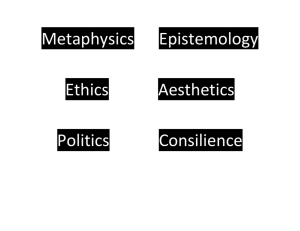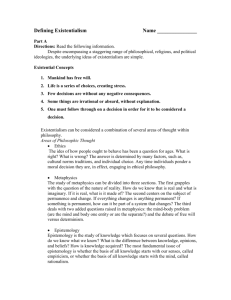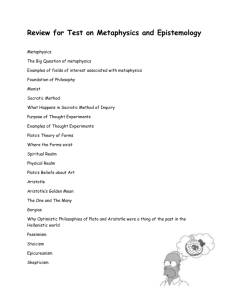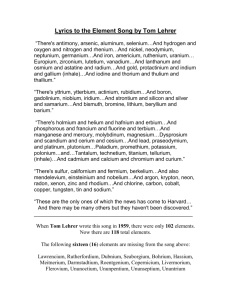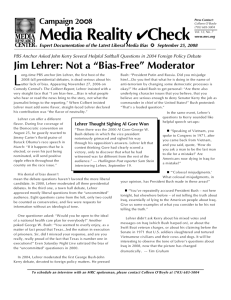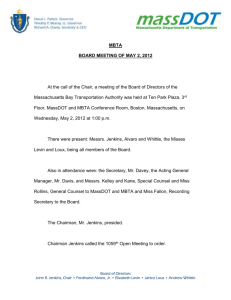PHI_351syl
advertisement
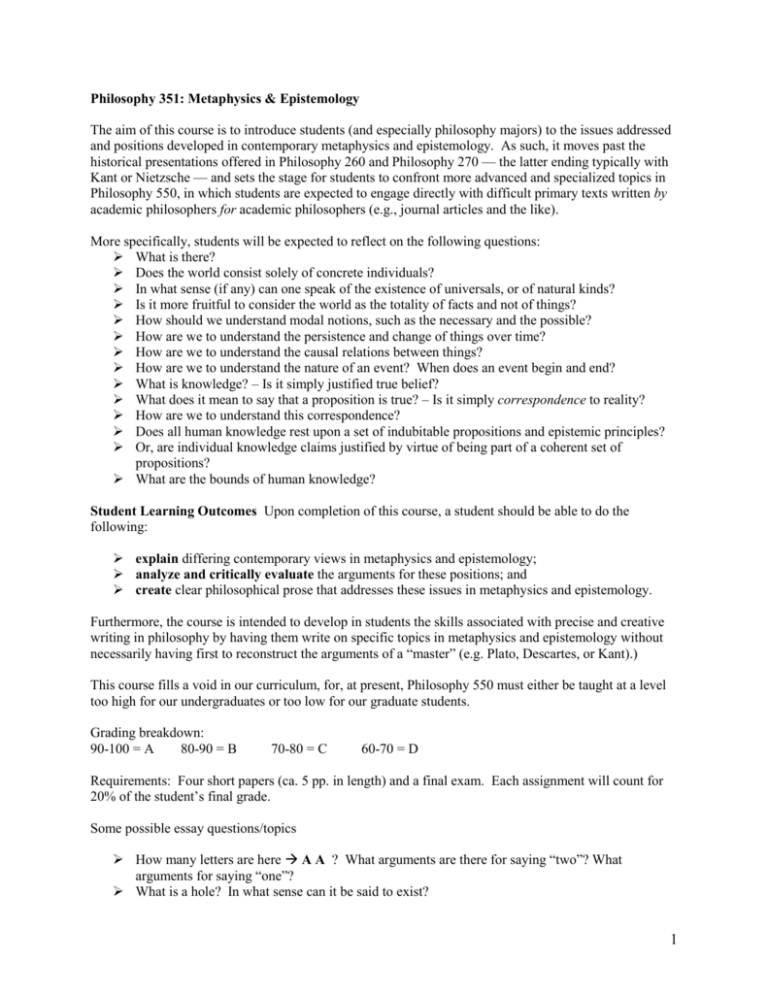
Philosophy 351: Metaphysics & Epistemology The aim of this course is to introduce students (and especially philosophy majors) to the issues addressed and positions developed in contemporary metaphysics and epistemology. As such, it moves past the historical presentations offered in Philosophy 260 and Philosophy 270 — the latter ending typically with Kant or Nietzsche — and sets the stage for students to confront more advanced and specialized topics in Philosophy 550, in which students are expected to engage directly with difficult primary texts written by academic philosophers for academic philosophers (e.g., journal articles and the like). More specifically, students will be expected to reflect on the following questions: What is there? Does the world consist solely of concrete individuals? In what sense (if any) can one speak of the existence of universals, or of natural kinds? Is it more fruitful to consider the world as the totality of facts and not of things? How should we understand modal notions, such as the necessary and the possible? How are we to understand the persistence and change of things over time? How are we to understand the causal relations between things? How are we to understand the nature of an event? When does an event begin and end? What is knowledge? – Is it simply justified true belief? What does it mean to say that a proposition is true? – Is it simply correspondence to reality? How are we to understand this correspondence? Does all human knowledge rest upon a set of indubitable propositions and epistemic principles? Or, are individual knowledge claims justified by virtue of being part of a coherent set of propositions? What are the bounds of human knowledge? Student Learning Outcomes Upon completion of this course, a student should be able to do the following: explain differing contemporary views in metaphysics and epistemology; analyze and critically evaluate the arguments for these positions; and create clear philosophical prose that addresses these issues in metaphysics and epistemology. Furthermore, the course is intended to develop in students the skills associated with precise and creative writing in philosophy by having them write on specific topics in metaphysics and epistemology without necessarily having first to reconstruct the arguments of a “master” (e.g. Plato, Descartes, or Kant).) This course fills a void in our curriculum, for, at present, Philosophy 550 must either be taught at a level too high for our undergraduates or too low for our graduate students. Grading breakdown: 90-100 = A 80-90 = B 70-80 = C 60-70 = D Requirements: Four short papers (ca. 5 pp. in length) and a final exam. Each assignment will count for 20% of the student’s final grade. Some possible essay questions/topics How many letters are here A A ? What arguments are there for saying “two”? What arguments for saying “one”? What is a hole? In what sense can it be said to exist? 1 Consider an apple. Take away its redness, its smell, its texture, its shape… (i.e. all its properties). Is there anything left? Can there be a “bare particular”? What is an event? How can you separate one event from another? Can something be the same thing in different possible worlds? If so, how? Can something be the same thing over time? If so, how? Are there things you can know with absolute certainty? Are there beliefs that are self-justified? Try to fill in the blank: “X is true if and only if _____” What problems do you encounter in filling in the blank? Does a coherence theory involve a circle or a regress? Consider the predicate “grue,” which means “green before time t, and blue thereafter.” Let t be sometime in the future. Is the statement “All emeralds are grue” true? What kinds of things external to you (or your mind) might turn your beliefs into knowledge? What can you say in the end to diffuse skepticism? Required Texts: (1) E.J. Lowe, A Survey of Metaphysics, Oxford, 2002, or M. Loux, Metaphysics: A Contemporary Introduction, Routledge, 2002. (2) R. Audi, Epistemology: A Contemporary Introduction, Routledge, 2003, or K. Lehrer, Theory of Knowledge, Westview, 2000. Schedule Part One: What is there? Week 1: The Problem of Universals I: Metaphysical Realism Reading: Loux, Ch. 1. Week 2: The Problem of Universals II: Nominalism Reading: Loux, Ch. 2. Week 3: Concrete Particulars I: Substrata, Bundles, and Substances Reading: Loux, Ch. 3. Week 4: Propositions and their Neighbors Reading: Loux, Ch. 4. Week 5: The Necessary and the Possible Reading: Loux, Ch. 5. Week 6: Concrete Particulars II: Persistence through Time Reading: Loux, Ch. 6. Part Two: What can we know? Week 7: The Analysis of Knowledge Reading: Lehrer, Chs. 1-2. Week 8: Foundationalism I: Infallible Foundations Reading: Lehrer, Ch. 3. Week 9: Foundationalism II: Fallible Foundations Reading: Lehrer, Ch. 4. Week 10: Coherentism I: Explanatory Coherence Reading: Lehrer, Ch. 5. Week 11: Coherentism II: Internal Coherence Reading: Lehrer, Ch. 6. Week 12: Coherentism III: Truth and Undefeated Justification Reading: Lehrer, Ch. 7. Week 13: Externalism Reading: Lehrer, Ch. 8. Week 14: Skepticism Reading: Lehrer, Ch. 9. 2


